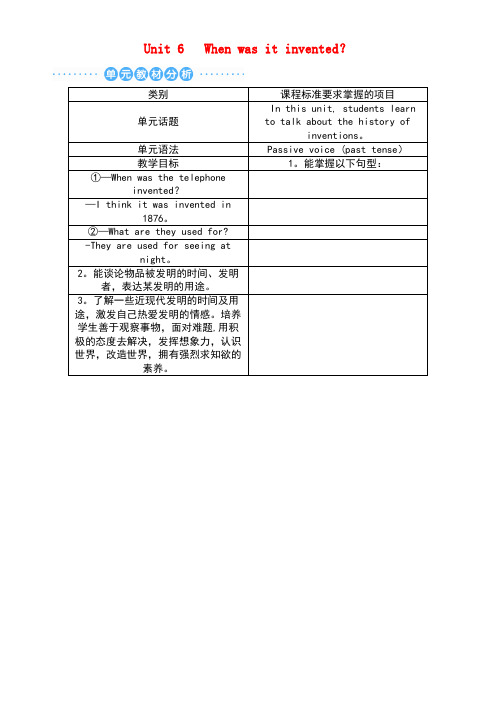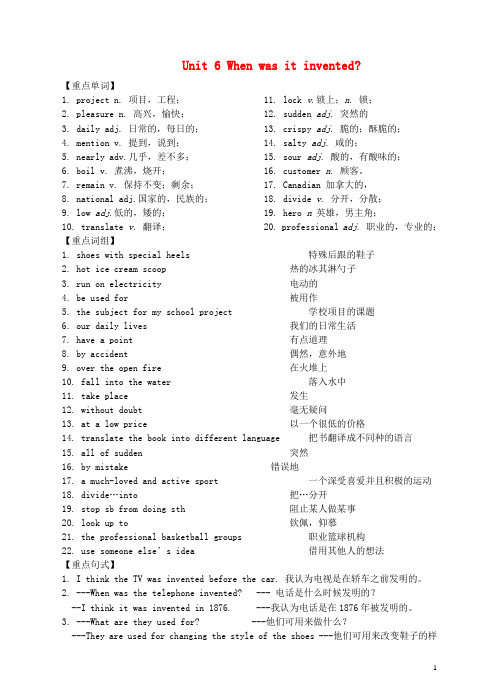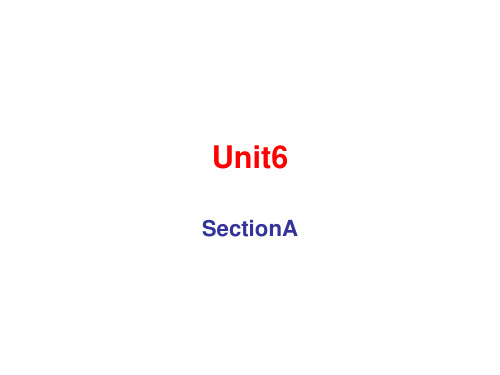九年级英语全册 Unit 6 When was it invented Period 5教学案
九年级英语全册Unit6Whenwasitinvented教案人教新目标版

Unit 6 When was it invented?类别课程标准要求掌握的项目单元话题 In this unit, students learn to talk about the history ofinventions。
单元语法Passive voice (past tense)教学目标1。
能掌握以下句型:①—When was the telephoneinvented?—I think it was invented in1876。
②—What are they used for?-They are used for seeing atnight。
2。
能谈论物品被发明的时间、发明者,表达某发明的用途。
3。
了解一些近现代发明的时间及用途,激发自己热爱发明的情感。
培养学生善于观察事物,面对难题,用积极的态度去解决,发挥想象力,认识世界,改造世界,拥有强烈求知欲的素养。
第一课时Section A(1a~2d)错误!错误!错误!错误!错误!§自主学习案翻译下列词组.1.特殊后跟的鞋子shoes__with__special__heels2.热的冰淇淋勺子hot__ice。
cream__scoop3.电动的run__on__electricity4.被用作be__used__as5.学校项目的课题the__subject__for__my__school__project6.我们的日常生活our__daily__lives7.有点道理have__a__point§课堂导学案Step 1 准备与热身(Preparation)展示一些近代发明的图片与近代发明的发明者,让学生们将图片与发明者相连。
T: Do you know what these inventions are?S1: It’s a car.S2: It's a telephone.S3:It’s a television.T: Do you know who these inventors are?S1: Karl Benz.S2: Alexander Bell.S3: J.L.Baird。
Unit+6 When+was+it+invented 英语人教版九年级全一册

7.【湖南人文】You won't find it fun uunntitlil you visit the ancient town,Pho enix in the West of Hunan provBiblioteka nce for yourself.
三、英汉互译。 1.Without doubt,reading is especially important for a child in the process of growing up. 毫毫无无疑疑问问,,读读书书对对在在成成长长过过程程中中的的孩孩子子来来说说尤尤为为重重要要。。 2.珍妮在花园意外地找到了她的手表。 JJeennnnyyfofouundndhehrewr awtcahtchbybayccaicdceindteinnttihne tghaerdgeanr.den.
4.daily adj.每日的;日常的 daily相当于 everyday。daily life意为“日常生活”。 5.list的用法 (1)用作动词,意为“列表;列清单”。 (2)用作名词,意为“名单;清单”,其常用短语:make a list,意为“列清 单”。
6.the style of the shoes鞋的样式 style作名词,意为“样式;款式;方式;作风”。the style of…意为“……的 样式/风格”。
4.take place发生(指按计划发生)。 5.doubt的用法 (1)作动词时,意为“怀疑”,后跟if,whether或that从句。 (2)作名词时,意为“疑惑;疑问”,常用短语为without/no doubt(毫无疑问; 的确)。
6.remain的用法 (1)作实义动词,意为“逗留;不离去”。 (2)作连系动词,其后跟形容词、名词、分词等,意为“仍然是;保持(某 种状态)”。
九年级英语全册 Unit 6 When was it invented核心常考词汇详解素材 (新版)人教新目标版

Unit6核心常考词汇详解1.invent (v.)发明;创造invent指发明创造出自然界本来不存在的东西,如工具、方法、手段、汽车、电器、合成材料等。
【备课例句】Bell invented the telephone. 贝尔发明了电话。
Smith invented a new teaching method. 史密斯发明了一种新的教学方法。
【横向辐射】discover, find, create1.discover是“发现”的意思,是指发现原来就有而一直没被发现,如发现电、煤、石油等矿藏及新星、星系或科学真理等。
Columbus discovered America in 1492.1492年哥伦布发现了新大陆。
Recently they have discovered a comet. 最近他们发现了一颗彗星。
2.find的意思是“寻找”,强调找的结果,并不指发现。
I've tried to find another copy but couldn't find one. 我试图再找一本,但没能弄到。
3.create指有目的地把原材料制成新产品,也指创造出原来不存在的或与众不同的事物。
Man creates himself. 人类创造了自己。
A novelist creates characters and a plot. 小说家塑造人物并设计情节。
【课堂变式】根据语境提示,用invent, discover,find或create的形式填空,完成句子。
1.When _____ the stream engine(蒸汽机) ___?2. I can’t ____ my bike, I’m looking for it.3. Scientists are now trying to ___ if this is possible.4. Do you know who______ the plane?5. He ____quite a number of wonderful characters in his play.【解析】I.1.was, invented 2.find 3.discover 4.invented 5. created2. be used for 用来做……此短语中的for是介词,表示用途,后接名词或动词-ing形式。
郑州市九年级英语全册Unit6Whenwasitinvented考点题型与解题方法

郑州市九年级英语全册Unit6Whenwasitinvented考点题型与解题方法单选题1、---Simon, do you know who invented the kite?---Sure! It ____ by Mozi over 2,000 years ago.A.is inventedB.inventedC.was inventedD.will be invented答案:C句意:Simon,你知道谁发明了风筝吗?---当然,它是于2000多年前被墨子发明的。
by引出动作的发出者,而前面的主语it(代指风筝)与选项动词之间是被动关系,事件发生于2000多年前,故句子用一般过去时态的被动语态来表达,答案选C。
小提示:初中英语教材中出现了五种时态的被动语态及带有情态动词的被动语态。
(1)一般现在时被动语态的构成:助动词am/is/are + 及物动词的过去分词English is spoken in many countries.(2) 一般过去时被动语态的构成:助动词was/were + 及物动词的过去分词Was this novel written by his father?(3) 一般将来时构成:will/be going to do + be + 及物动词的过去分词The baby will be taken good care of in the hospital.(4) 现在完成时被动语态的构成:助动词have/has + been + 及物动词的过去分词Has his work been finished yet?(5) 现在进行时被动语态的构成:am/is/are + being + 及物动词的过去分词The problem is being discussed by the students.(6)带有情态动词的被动语态的构成:情态动词 + be + 及物动词的过去分词Your composition must be handed in tomorrow.2、In 1958, pinyin ________by Chinese linguist(语言学家)Zhou Youguang and his team. A.designsB.designedC.is designedD.was designed答案:D句意:1958年,中国语言学家周有光和他的团队设计了拼音。
九年级英语全册 Unit 6 When was it invented?知识点总结 (新版)人教新目标版

Unit 6 When was it invented? 【重点单词】1. project n. 项目,工程;2. pleasure n. 高兴,愉快;3. daily adj. 日常的,每日的;4. mention v. 提到,说到;5. nearly adv.几乎,差不多;6. boil v. 煮沸,烧开;7. remain v. 保持不变;剩余;8. national adj.国家的,民族的;9. low adj.低的,矮的;10. translate v.翻译;11. lock v.锁上;n. 锁;12. sudden adj. 突然的13. crispy adj. 脆的;酥脆的;14. salty adj.咸的;15. sour adj.酸的,有酸味的;16. customer n.顾客。
17. Canadian 加拿大的,18. divide v.分开,分散;19. hero n英雄,男主角;20. professional adj. 职业的,专业的;【重点词组】1. shoes with special heels 特殊后跟的鞋子2. hot ice cream scoop 热的冰其淋勺子3. run on electricity 电动的4. be used for 被用作5. the subject for my school project 学校项目的课题6. our daily lives 我们的日常生活7. have a point 有点道理8. by accident 偶然,意外地9. over the open fire 在火堆上10. fall into the water 落入水中11. take place 发生12. without doubt 毫无疑问13. at a low price 以一个很低的价格14. translate the book into different language 把书翻译成不同种的语言15. all of sudden 突然16. by mistake 错误地17. a much-loved and active sport 一个深受喜爱并且积极的运动18. divide…into 把…分开19. stop sb from doing sth 阻止某人做某事20. look up to 钦佩,仰慕21. the professional basketball groups 职业篮球机构22. use someone else’s idea 借用其他人的想法【重点句式】1. I think the TV was invented before the car. 我认为电视是在轿车之前发明的。
郑州市九年级英语全册Unit6Whenwasitinvented典型例题

郑州市九年级英语全册Unit6Whenwasitinvented典型例题单选题1、—“Frog”, Mo Yan's latest novel, please!—Sorry, it ________ just now. But it will come out again soon.A.sold outB.is sold outC.has sold outD.was sold out答案:D句意:——请给我莫言的最新小说,《青蛙》!——抱歉,刚刚已经卖完了。
但是它很快又会出版的。
考查一般过去时的被动语态。
时间词just now“刚才”,说明时态是一般过去时,故排除BC;主语it和谓语sell out“出售”之间是被动关系,表示书被卖完了,故用一般过去时的被动语态,结构:was/were+动词过去分词,主语it是第三人称单数,故be动词用was。
故选D。
2、—Could you please help me carry the bag?—________.A.It’s a pleasureB.With pleasureC.You’re welcomeD.It doesn’t matter答案:B句意:——你能帮我拿一下包吗?——乐意效劳。
考查情景交际。
It’s a pleasure不用客气;With pleasure乐意效劳;You’ re welcome不用谢;It doesn’t matter没关系。
根据“Could you please help me carry the bag?”可知,此处表请求,综合选项可知,此处为肯定回答,即With pleasure。
故选B。
3、In Switzerland, keeping only one goldfish isn’t ________, because the government believes it is very bad to make su ch social animals live alone.A.stoppedB.doubtedC.refusedD.allowed答案:D句意:在瑞士,只养一条金鱼是不允许的,因为政府认为让这些群居动物独自生活是非常不好的。
人教版英语九年级Unit6 When was it invented?全单元知识点讲解

The teacher came in with a smile on
his face.
面带微笑
• project n.项目;工程
• pleasure n.高兴;愉快 eg:Reading gives me much pleasure.
常用短语:My pleasure./It's a /my pleasure./With pleasure.(很乐意/荣幸)
注意:Don't mention it. 用于口语,主要来 回答感谢,有时也用来回答道歉。
➢---Thank you very much. ---Don't mention it.不客气/不要这样说
➢---I'm sorry to trouble you. ---Don't mention it.没关系
daily English=daily English日常英语 adv.每天;每日=every day 作状语
eg:He comes here daily/every day. 拓展:daily n.日报
People's Daily《人民日报》 China Daily 类似的词:weekly adj.每周的 adv.一周一次
2.Well,you do seem to have a point... “do (does, did) + 动词原形”表示强调。 意为“确实;务必;一定;的确”。
eg:He d__o_e_s_come from America. 他的确来自美国。
I _d_i_d__call you yeaterday. 昨天我确实给你打电话了。
• pioneer n.先锋;先驱 China Young Pioneers中国少年先锋队
洛阳市九年级英语全册Unit6Whenwasitinvented全部重要知识点

洛阳市九年级英语全册Unit6Whenwasitinvented全部重要知识点单选题1、Paper-making ________ by the Chinese in the Western Han Dynasty(朝代).A.is inventedB.inventedC.was invented答案:C句意:造纸术是中国人在西汉时期发明的。
本题考查被动语态。
主语是"Paper-making"造纸术,它和invent之间是被动关系,先排除B项;再结合in the Western Han Dynasty可知时态是一般过去时,其结构是was done的形式。
故选C。
2、The kite ________ in China more than 2000 years ago.A.inventsB.inventedC.is inventedD.was invented答案:D句意:风筝是中国在2000多年前发明的。
考查一般过去时的被动语态。
invent发明。
invents动词的第三人称单数形式;invented动词的过去式;is invented一般现在时的被动语态;was invented一般过去时的被动语态。
题中主语“The kite”与动词invent之间是动宾关系,此处用被动语态;结合题干中时间状语“2000 years ago”可知要用一般过去时的被动语态,其结构为was/were done。
故选D。
3、The writing brush is used _________ writing _________ the teacher.A.for; byB.to; forC.to; byD.for; as答案:A句意:毛笔是老师用来写字的。
考查介词辨析。
for为了;by被、由;to到……;as作为。
被用来干什么:be used for,固定搭配;被动语态中指出动作的执行者,应用介词by。
- 1、下载文档前请自行甄别文档内容的完整性,平台不提供额外的编辑、内容补充、找答案等附加服务。
- 2、"仅部分预览"的文档,不可在线预览部分如存在完整性等问题,可反馈申请退款(可完整预览的文档不适用该条件!)。
- 3、如文档侵犯您的权益,请联系客服反馈,我们会尽快为您处理(人工客服工作时间:9:00-18:30)。
III.感受新知
Work on1a
1. Tell Ssthatthe words in the box describe how food can taste. Write them under the correct p ictures. Some pictures have more than one word.
④At the same time, they need to stop the competingteam from getting the ball into their own basket.
⑤These stars encourage young people to work hard to ac hieve their dreams.
6. The custom was happy in the end.
3. Play the recording for the Ss. Listen for the first time. Play the recording again and judge T or F.
Keys: T, F, T, F, F, T
2. Potato chips were invented by mistake.
2.Ask some questions about them.
1. What did they eat?
S1: Ice cream.
2. What did the big dog think of the ice-cream?
S2:Sweet, cool, and delicious!
II.兴趣导入
Step 3Pair work
1. Work in pairs.Make a conversation about the invention of potato chips. Use the information in1cand 1d.
2. Ask somepairsto act out their conversation in front of the class.
IV.梳理巩固
Listening
Work on1c
1. TellSs the conversation is about how the p otato chips were invented. The story is ve ry interesting.
2. First, letone Ss read the sentences in1c. Make sure they know the meaning of each sentence.
Work on 1d
1. Let Ss read the article in 1d first. Tell Ss to listen again and fill in the blanks with the right words.
2. Play the recording again for the Ss to listen and write the words.
2)能掌握以下句型:
①Potato chips were invented by mistake.
②It is b elieved that the first basketball game in history was played on December 21, 1891.③Dr. Naismith divided the men in hisclass into two teams and taught them to play his new game.
2. Ss work with t heir partners and try to write some proper words under the pictures.
3. Let some Ss read their answers. Try to remember the new words.
2.情感态度价值观目标:
了解世界上一些对人类有着重大意义的发明的相关信息,开阔学生的眼界,养成勤于思考,
善于发现的好习惯,培养学生的创造精神。
学习重点
1)掌握本课时出现的生词及用法。2)进行听力训练,提高综合听说能力。
学习难点
听力训练
教学步骤
教学过程
二次备课
I.温故知新
1. Let Ss watch an interesting picture.
Unit 6 When was it invented Period 5
课题名
主备人
课时
Period 5 (Section B1a-1e)
学习目标
1.语言知识目标:
1)能掌握以下单词:crispy,salty, sour, by mistake, customer, the Olympics, Canadian, divide, divide…into, basket, popularity, look up to, hero , professional
展探究
1. salty咸的
salty (tasting of salt)形容词,意为“咸的;含盐的”,是由名词salt(盐)加后缀-y构成的。
►The soup is a little salty for me. 汤对我来说有点咸了。
名词+后缀-y构成的形容词:
luck—luckyhealth—healthy wind—windy rain—rainy taste — tas ty ice —icysnow —snowy sun—sunny
3. The customer thought the potatoes were not thin enough.
4. The customer said they were not salty enough.
5. George wanted to make the customer happy.
